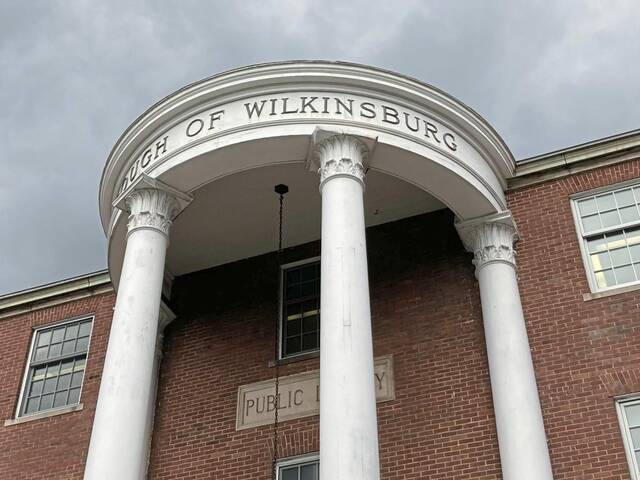A meeting held Thursday on a proposal for Pittsburgh to annex neighboring Wilkinsburg revealed clear divisions of opinion on the would-be move, even as details about the proposal remain largely unclear.
“I don’t feel that I — or any of us on council or members of the public — have seen hard numbers,” said Pittsburgh Councilwoman Deb Gross. “I just have more questions than answers.”
Over the summer, the Wilkinsburg Community Development Corp. gathered enough petition signatures in favor of annexation to move the process forward. Getting the proposal to appear as a ballot referendum in Wilkinsburg requires the approval of Allegheny County Common Pleas Court and Pittsburgh City Council.
Wilkinsburg’s elected officials don’t have a formal say-so in the process, though a majority of council members who spoke Thursday expressed opposition to annexation.
“I’ve seen many changes to my borough. This is not one I need to see,” Wilkinsburg Councilwoman Paige Trice said.
She said she was concerned about the impact that annexation might have on emergency response times, especially if first responders from the city aren’t familiar with Wilkinsburg.
She also noted that Wilkinsburg hasn’t raised taxes since 2004, something she said shows the borough has the financial stability to remain its own entity.
Councilwoman Pamela Macklin said Wilkinsburg is a diverse community with diverse leadership, and she fears that might be lost in an annexation.
“Because it’s smaller and we have nine council members, we have greater representation on council,” she said, adding that the borough council typically has four or five people of color while the nine-member Pittsburgh City Council currently has two people of color.
Wilkinsburg Councilman Andre Scott said any discussion of annexation should be put on hold while both communities are transitioning to new mayors. He said a “very slim percentage” of constituents he’s spoken with support annexation.
Wilkinsburg and Pittsburgh already have a close relationship, with the borough paying Pittsburgh for fire protection and garbage collection. Wilkinsburg students in grades 7-12 attend Pittsburgh Public Schools.
“We have had forever a very good relationship with the city of Pittsburgh. Going forward, we want to continue that relationship,” said Denise Edwards, president pro-tempore of Wilkinsburg’s council. “I do not believe that an annexation is in the best interest of our residents. We have demonstrated an ability to govern ourselves.”
Ira Weiss, a Pittsburgh lawyer who has represented several municipalities and school districts, including Pittsburgh Public Schools, said annexing Wilkinsburg would be a poor financial decision for Pittsburgh and could include tricky legal matters.
Wilkinsburg’s school district would become part of Pittsburgh Public Schools under an annexation, Weiss said. As a result, he said, Pittsburgh Public Schools would have to take on Wilkinsburg’s “substantial” debt and contend with transportation costs that would “increase substantially.”
Employees at the two districts are represented by different unions, which Weiss said could pose a “very significant legal issue.”
An annexation also would trigger a new reapportionment process for both school board and City Council districts, a process Weiss described as “time-consuming, expensive and complicated.”
Pittsburgh City Controller Michael Lamb, however, argued that annexation could be beneficial for Pittsburgh.
Bringing Wilkinsburg into Pittsburgh would bolster the city’s declining population and increase the tax base.
“It’s a good deal for us,” he said.
Two members of Wilkinsburg’s council said they thought annexation would be a good deal for people in the borough, too.
Councilman Ian Petrulli said he felt that joining Pittsburgh would create more opportunities for redeveloping the community. He acknowledged there could be some short-term complications, but said it’s more important to focus on the “long-term vision.”
Councilwoman Ariel Haughton said she thought the measure could “drastically improve their lives in many cases” for Wilkinsburg residents.
Some Pittsburgh City Council members said it was too soon for them to articulate well-informed opinions.
Councilman Ricky Burgess, whose district is directly beside Wilkinsburg, said his biggest concern is in the process, which gives no voice to Wilkinsburg’s council or Pittsburgh’s voters. It would require support only from Pittsburgh City Council and Wilkinsburg voters.
“I think over time, the Wilkinsburg merger makes sense and is probably a good idea,” he said. “I think the process we’re using is unfair.”
Councilman Anthony Coghill noted that property taxes in Wilkinsburg are nearly double Pittsburgh’s tax rates, while Councilman Bobby Wilson pointed out that Wilkinsburg has no payroll tax for businesses, meaning that joining Pittsburgh would create a new tax for employers there.
Councilwoman Deb Gross said officials needed specific answers to questions regarding such financial questions and how debt mergers would work, what would happen to the municipal water and sewer authority that Wilkinsburg shares with a neighboring municipality and how many vacant properties Wilkinsburg has.
Until the Wilkinsburg CDC introduces their petition to a judge and the judge approves it, City Council can’t hold a vote on the measure. Several council members, however, said they’d like to continue having such conversations and gathering more information to be prepared for a potential vote.








